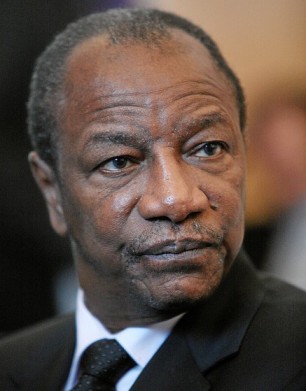President Alpha Conde. Photo by World Economic Forum under a CC Licence.
Last week, explosives were used in an attempt on the life of a head of state. No, I am not talking about Norway. I am talking about the west African state of Guinea.
On the night of 19 July, attackers fired rockets into President Conde’s bedroom at the presidential residence. He escaped harm only because he had been sleeping in another room at the time of the attack. A second attack ensued, with the assailants finally being subdued after a two-hour gun battle.It is still unclear as to whether it was an assassination attempt or a coup d’etat attempt, but several hours later, the former army chief was arrested.
Chances are, you don’t know about this assassination attempt and the ensuing gun battle in Guinea. Why? Because few media corporations have deemed the incident newsworthy. The New York Times printed a 91-word briefing from Reuters on page six. The Times of London devoted 39 words to the incident on page 33. There were no follow-up articles in either case – this was the first and last time Guinea was mentioned. The Australian newspaper and Japanese newspapers (the Yomiuri and Asahi) ignored the events altogether. Thankfully, there were some rare examples of substantive articles provided by AFP, Reuters and Christian Science Monitor.
Chances are, you do know about the attempt on the life of the Prime Minister of Norway and the massacre that followed. On the first day of coverage following the incident, the New York Times placed it on page one in a 1,336-word article – a collaborative effort written by seven contributors, based in Oslo, New York, London, Paris and Washington. It was also page-one coverage for the Times of London – on the first day of coverage, it devoted 1,915 words to the incident. Needless to say, there has been major internet and television coverage as well.
The reasons for the heavy coverage of the incidents in Norway are obvious. There was a blast targeting the Prime Minister, and as the article in the Times of London made sure to mention, the massacre was the worst violence seen in Norway since World War II. It was unexpected, violent and sensational. There was a terrible loss of human life.
But why have the events in Guinea been deemed so unworthy of attention, so ignorable? At a national level, the events in Guinea are arguably more politically significant than those in Norway. The violence in Norway appears to have been an isolated event perpetrated by a single individual. The events in Guinea were a coordinated strike that most likely involved part of the armed forces of that country.
This is all the more important considering that this is a critical stage in Guinea’s nascent and fragile democracy. In late 2010, Guinea held its first democratic elections since independence in 1958. This followed decades of dictatorship under Lansana Conte, followed by a military regime that took power in a coup d’etat immediately following Conte’s death. The historic elections were a close contest and were followed by some violence, but the period since has been Guinea’s best chance at a stable democracy so far. This makes last week’s events particularly significant. Let us also not forget that Guinea is the world’s leading producer of bauxite, which is used to make aluminium.
As for the issue of the loss of human life, while it is true that on this particular occasion, there have been more deaths in Norway (93) than in Guinea, in general, the scale of a humanitarian tragedy has little (if anything) to do with the levels of media coverage it attracts. The military junta in Guinea was responsible for a massacre that killed at least 159 unarmed civilians in 2009. It also failed to generate any substantive levels of media coverage. And the media has routinely paid relatively little attention to conflict in the DRC that has cost more than 5.4 millions lives since 1998. Clearly, the level of loss of human life in itself does not explain the high level of coverage of the events in Norway.
In this case, it is the loss of life in a predominantly white and wealthy European country (the victims are of the type that Western audiences can relate to and sympathise with), combined with the unexpected nature of the tragedy (in an otherwise stable and peaceful place) that has provided the impetus for the coverage.
The skin colour and socioeconomic status of the victims in Guinea leave them at an immediate disadvantage with Western media corporations and their audience. Furthermore, because there is a chronic and widespread shortage of coverage of Guinea, and of Africa in general, audiences in the West have little background knowledge or context to which to relate or attach significance. Guinea is not seen as a separate country with unique circumstances. It is simply lumped together with the other 54 countries that make up Africa. And Africa carries with it an image of violence and political instability (although most of Africa is at peace most of the time). The events in Guinea fit this broad, extremely oversimplified and misleading ‘pattern’.
As such, the events in Guinea are not seen as unexpected – and are therefore not newsworthy, regardless of the political implications. Attacks on democracy, and the loss of human life, are, to a large degree,‘tolerated‘, because these things seem to happen there (on the continent as a whole) more often, and because, from a Western perspective, people there are not ‘like us’.
The media coverage on this occasion, of course, does nothing to change this – it perpetuates it. A 39-word briefing on page 33 of a newspaper cannot hope to convey to the audience any political significance of the events unfolding, or offer any opportunity to generate interest, concern or sympathy.
The vicious cycle, the spiral of silence that helps keep that distance between Africa and the rest of us, continues.



